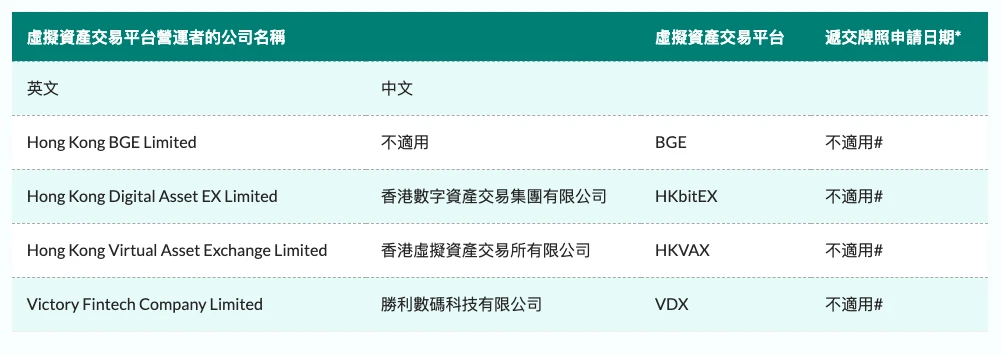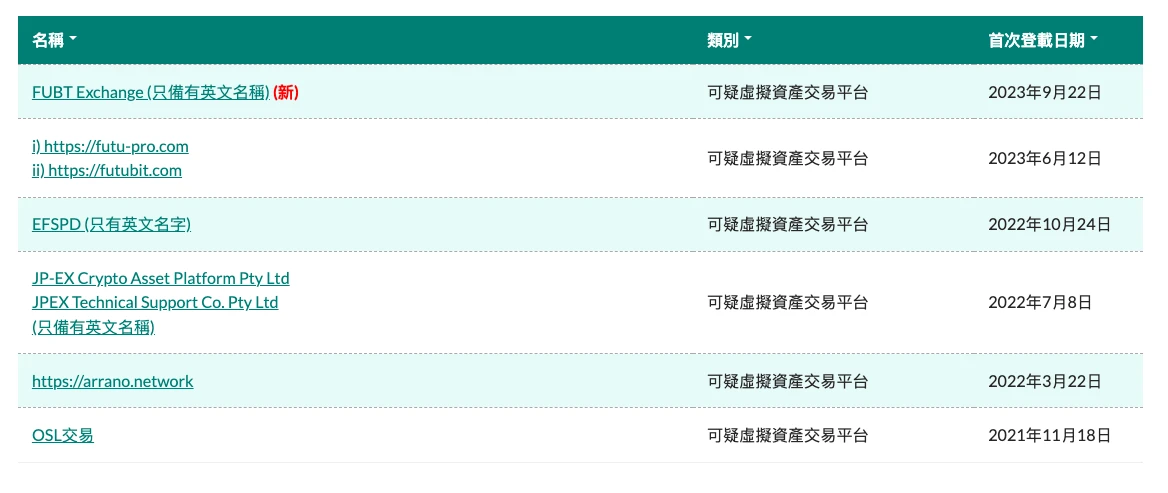Original - Odaily
Author - Qin Xiaofeng

As the scale of the case involving the encryption platform JPEX expands, the Hong Kong Securities and Futures Commission has begun to disclose more information about the Virtual Asset Trading Platform (VATP) in order to enhance public anti-fraud awareness and enhance information transparency.
On September 29, the Hong Kong Securities and Futures Commission released multiple reports on virtual asset trading platforms on its website today.List (click to jump): List of licensed virtual asset trading platforms, list of virtual asset trading platform applicants, list of closed virtual asset trading platforms, list of virtual asset trading platforms deemed to be licensed, and a special list of suspicious virtual asset trading platforms. Odaily also immediately analyzed the more detailed information behind these lists for readers.
The first is the List of Licensed Virtual Asset Trading Platforms, of which there are currently only two:OSL Digital Securities Limited(Platform: OSL Exchange) andHash Blockchain Limited(Platform: HashKey Exchange).

It should be noted that the current licensing system for virtual asset trading platform operators in Hong Kong is a dual license system; in addition to security tokens that are applicable to the licensing system (SFO) of the Securities and Futures Ordinance, there are also Another licensing regime for “non-security tokens” applies to the Anti-Money Laundering Ordinance (AMLO). Both OSL Exchange and HashKey Exchange platforms have currently obtained the first license, which was approved on December 15, 2020 and November 9, 2022 respectively. The second license has no license record.
However, this does not prevent them from providing crypto trading services to the market. For example, OSL has been approved by the Hong Kong Securities and Futures Commission in August this year to upgrade its existing license and can officially provide retail investors with trading services for mainstream currencies such as Bitcoin and Ethereum; HashKey Exchange has also opened BTC/HKD and ETH/HKD trading pairs to retail investors. But other altcoins, such as Avalanche, are only available to professional investors.
The second is the List of Applicants for Virtual Asset Trading Platforms. There are currently four companies, namely: Hong Kong BGE Limited (Platform: BGX), Hong Kong Digital Asset EX Limited (Platform: HKbitEX), Hong Kong Virtual Asset Exchange Limited (Platform: HKbitEX) : HKVAX) and Victory Fintech Company Limited (Platform: VDX).

The Securities and Futures Commission stated that all entities on the applicant list have not been licensed by the Securities and Futures Commission and may not comply with the requirements of the Securities and Futures Commission; applications that fail to meet the standards will be returned by the Securities and Futures Commission, and the names of the applicants for the virtual asset trading platform will be changed from The list of applicants for the virtual asset trading platform has been removed and will be added to the list of removed applicants; the main purpose of publishing this list is to facilitate the public to judge whether the virtual asset trading platform has made misrepresentations about its license application (such as claiming to have An application for a license was submitted but was not actually submitted).
According to Hong Kong media, dozens of encryption platforms, listed companies, and securities companies have previously announced that they are applying for, plan to apply for, or have applied for Hong Kong encryption licenses, namely: Binance, OKX, ByBit, HTX Exchange, BingX, Bitget, Gate .io, Gate.hk, Guofu Innovation (00290), Sunco Technology (01063), American Lion Group Holdings LGHL, Greenland Jinchuang, a subsidiary of Greenland Holdings Group, and Bullish, a subsidiary of Block.one.
The relevant backgrounds of the four companies currently applying for licenses are as follows:
(1)HKBGE. HKBGE is a wholly-owned subsidiary of Hong Kong-listed company HKE Holdings (01726). It submitted applications for No. 1 and No. 7 license plates last year. The former CEO of HKBGE, Thor Chan, was the former CEO of the defunct exchange AAX Lianchuang. In December last year, HKE Holdings announced that Thor Chan had resigned as director and CEO of HKBGE, and the groups member companies (including HKBGE) merged with AAX. No business relationship whatsoever. Subsequently, HKBGE appointed Ouyang Jiannan, the former chief operating director of HashKey Exchange, as CEO. Currently, HKBGE is only open to invited professional investors.
(2)HKbitEX. HKbitEX is affiliated to Taiji Capital Group and has always regarded itself as one of the first institutions to apply for VATP. Its founder, Gao Han, worked for the Hong Kong Stock Exchange (00388) in the past and participated in Southbound Trading, Bond Connect, etc. during this period. After Gao Han founded HKbitEX, he recruited many former colleagues from the Hong Kong Stock Exchange to join. Chief Development Director Shi Lin was the former co-head of the listing review team of the Hong Kong Stock Exchange.
In September this year, Taiji Capital Group announced the launch of Hong Kongs first real estate fund security token offering (STO), and the closed-end fund of its subsidiary Pioneer Asset Management issued the token PRINCE, targeting professional investors with a target of raising approximately 100 million. Hong Kong dollar. If regulatory approval is obtained, the group plans to use the tokens to list its virtual asset trading platform HKbitEX in the future.
(3)HKVAX. HKVAX announced in August that it had received a notice of in-principle approval from the Securities and Futures Commission to conduct Type 1 and Type 7 regulated activities and would become the third licensed virtual asset trading platform in Hong Kong. HKVAX co-founder and operating director Fok Siu-leung said that it will take at least half a year to obtain the first and seventh types of licenses from the Hong Kong Securities and Futures Commission. It plans to launch platforms, OTC over-the-counter trading and other services by then, but whether to launch STO (security token) It depends on the regulations of the Hong Kong Securities Regulatory Commission (Odaily Note: The content is claimed by the platform itself and has not been confirmed by the Hong Kong Securities Regulatory Commission; Odaily searched the official website of the Securities Regulatory Commission and did not find the platform’s so-called in-principle approval notice.).
The HKVAX website shows that the company has three co-founders. CEO Wu Weiliang was the managing director of CITIC Futures International and is currently the vice chairman of the Financial and Treasury Services Committee of the Hong Kong General Chamber of Commerce (HKGCC).
(4)VDX. VDX is an encryption platform owned by Victory Securities (08145), a Hong Kong-listed company. The company’s executive directors include Gao Juan, chairman of the Hong Kong Securities Association. In September this year, Victory Securities announced that the virtual asset trading app would be available on the Apple Store and Android systems. It is worth noting that its virtual asset trading services are only available to professional investors.
Chen Peiquan, executive director of Victory Securities, said that it is expected that the Hong Kong Securities Regulatory Commission will soon announce guidelines for securities firms to open retail trading of virtual assets. Based on the expected progress, Victory Securities may open retail virtual asset trading in the fourth quarter of 2023.
Gao Juan, CEO of Victory Securities, said that the company is only connected to the licensed virtual asset exchange OSL. Investors can buy and sell cryptocurrencies on this exchange through the company. The other party only provides BTC and ETH, and the cryptocurrencies purchased by investors will be deposited in OSL is covered by insurance and the company is ready to connect to other licensed exchanges.
In the list published by the China Securities Regulatory Commission, there are also three items that are blank: List of applicants whose relevant license applications have been returned, rejected or withdrawn; List of closed virtual asset trading platforms lists those who are required to do so according to relevant laws. The names of virtual asset trading platform operators that have ceased operations within the specified period; the List of Virtual Asset Trading Platforms Deemed to be Licensed lists the virtual asset trading platforms deemed to be licensed as of June 1, 2024 The name of the operator.
Finally, the Hong Kong Securities and Futures Commission also released a list of suspicious virtual asset trading platforms, involving six platforms, and their names are:
JPEX: Falsely claimed that it had obtained a license to operate a virtual asset trading platform from several overseas regulatory agencies, provided false high returns for some products, restricted users from withdrawing assets, etc., websitehttps://jp-ex.io/
FUBT Exchange, which has the same name as the already popular Fubit Exchange, claims to be a crypto trading platform and provides a false Hong Kong phone number. It is said to have a business base in Hong Kong with the website address:www.fubthk.com
Futu: Using the same company logo to impersonate Futu Securities International (Hong Kong) Co., Ltd., a SFC-licensed institution, athttps://futu-pro.com; https://futubit.com
EFSPD: Falsely claimed that it had been approved by Hong Kong Exchanges and Clearing Limited to launch crypto tokens, and claimed that it was regulated by the Hong Kong Monetary Authority. The website iswww.efspd.com
OSL transaction: Pretending to be a licensed institution, OSL, with the website address:www.hifly 59702.top
arrano: Falsely claiming to be a one-stop platform for NFT and cryptocurrency products athttps://arrano.network

The China Securities Regulatory Commission stated that it will regularly update the above list, and investors should avoid buying and selling virtual assets on unregulated virtual asset trading platforms (including any applicants listed on the virtual asset trading platform applicant list) to prevent financial risks, otherwise It may be difficult to obtain compensation through legal means.










